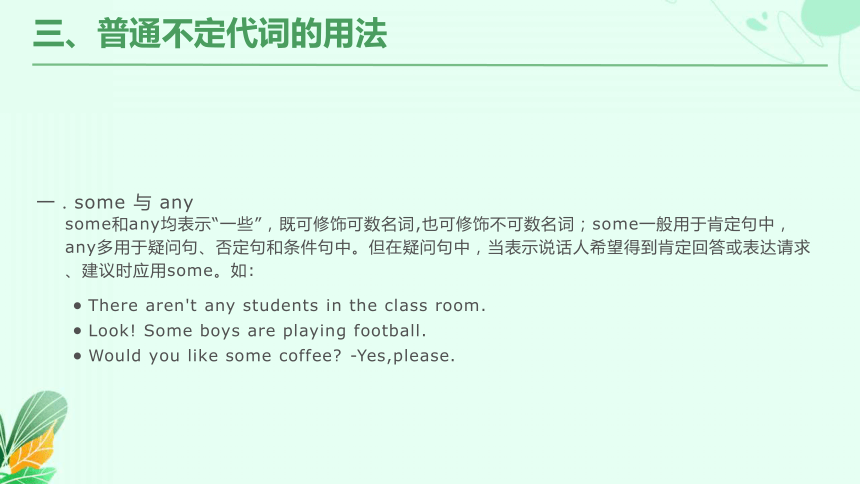2024届高考英语语法 代词 课件(共22张PPT)
文档属性
| 名称 | 2024届高考英语语法 代词 课件(共22张PPT) |  | |
| 格式 | pptx | ||
| 文件大小 | 1.9MB | ||
| 资源类型 | 教案 | ||
| 版本资源 | 通用版 | ||
| 科目 | 英语 | ||
| 更新时间 | 2024-02-11 18:36:17 | ||
图片预览









文档简介
(共22张PPT)
语法——代词
初中考点 ·人称代词主格和宾格的用法;
·形容词性物主代词和名词性物主代词的用法;
·反身代词的用法;
·常用不定代词的用法及辨析;
·明确代词所代替的部分的词类和单复数。
高中考点 ·区别各类代词的不同意义;
·巩固 some,any,none,no,everything,anything,nothing,something,other,the other,another,both,all,either,neither等的用法;
·it,this,that,these,those,one等的替代作用;
·it的深化用法
初中要点回顾
PART.01
几个人称代词并列做主语时,排列顺序一般为:
但承认错误时,I放在前:如:
you and I;you and he/she;you,he/she and I; we and you; we and they; we, you and they。
I and Tom made the mistake.我和汤姆犯了这个错误。
一、人称代词的排列顺序
物主代词有形容词性物主代词和名词性物主代词之分。形容词性物主代词之后一定要接名词,而名词性物主代词之后不需接任何词。如:这张票是她的,不是我的。
01
[误] This is hers ticket. It's not my.
01
[正] This is her ticket. It's not mine.
01
二、形容词性物主代词和名词性物主代词的区别
三、普通不定代词的用法
some 与 any
some和any均表示“一些”,既可修饰可数名词,也可修饰不可数名词;some一般用于肯定句中,any多用于疑问句、否定句和条件句中。但在疑问句中,当表示说话人希望得到肯定回答或表达请求、建议时应用some。如:
There aren't any students in the class room.
Look! Some boys are playing football.
Would you like some coffee -Yes,please.
三、普通不定代词的用法
many与much
many修饰可数名词复数,还可以与表示程度的副词so,too,how连用。much修饰不可数名词,也可以与表示程度的副词so,too, how 连用。如:
He never eats so much break fast.
How many bottles of water do you need Yb
either与neither
either指两个之中的任意一个,nither指两个人或物中一个也不,常构成固定结构either/neither of+名词(或代词)的复数+谓语动词;当either…or…和neither…nor…连接两个主语时,谓语动词应与离它最近的主语在人称和数上保持一致。如:
Neither of the books is good. Neither you nor he is wrong.
三、普通不定代词的用法
普通不定代词的用法
both 与all
both表示“两者都”,常与and连用;all指“三者或三者以上都”,常与of连用。如:
Both she and I are students. Both plans are good.
Jim,Lucy and Lily all agree to stay here.
普通不定代词的用法
each与every
each和every都表示“每一”。each强调个体,当它作主语时,谓语动词用单数形式;every强调整体情况,修饰名词时谓语动词也要用单数形式。另外,each可指两个或两个以上的人或事物,而every只可指三个或三个以上的人或事物。如:
There are flowers on each side of the road.
Every tree here is very tall.
四、little;a little;few;a few
Would you please buy some salt for me,Tony?There is little left.
托尼,可以给我买些盐吗 已经快没有了。
I recognized a few of other people.
我认出了一些其他的人。
代替复数名词 代替不可数名词
肯定 a few(有,一些) a little(有一点儿)
否定 few(几乎没有) little(几乎没有)
不定代词 意义 用法说明
other 另外的 只做定语,常与复数名词或不可数名词连用;但如果前面有the,this,that,some,any,each,every,no,one,my,your,his等,则可与单数名词连用。
the other 两者中的另一个 常与one连用,构成“one...,the other...”结构;作定语修饰复数名词时,表示“其余的全部”。
others 泛指别的人或物 是other的复数形式,泛指别的人或物(但不是全部),不能作定语,可以构成“some...others...”结构。
the others 特指其余所有的人或物 是the other的复数形式,特指其余所有的人或物。
another 任何一个,另一个 指三者或三者以上中的任何一个,用作形容词或代词。
五、other;the other;others;the others; another
高中考点对接
PART.02
一、指示代词that和those考查深化
that和those常用来代替前面提到过的名词,以免重复。如:
The weather in Chengdu is not so hot as that (the weather) in Chongqing.
成都的天气没有重庆(的天气)那么热。
The books on the shelf are more interest ing than those
(=the books,the ones) on the desk.
架子上的书比桌子上的书有趣。
1. all,everything,everyone,everybody, each,both等用于否定句表示部分否定。如:
A11 horses are animals but not all animals are horses.
所有马都是动物,但并非所有的动物都是马。
2.不可以说everyone/everybody of…,可以说every one of...
3.all用作人称代词宾语的同位语时,all在人称代词之后,如: you all,us all,them all相当于all of you,all of us,all of them
二、不定代词的特殊用法
In fact it is a hard job for the police to keep order in an important football match.
1.用作形式主语,代替由不定式、动名词或名词性从句充当的真正主语。如:
It's no use arguing with her about tha matter.
事实上,有重要的足球赛时,警察维持秩序是一项很困难的工作。
It's true that he is ill.他生病了是真的。
和她争论那件事没用。
三、代词it的考查深化
The chairman thought it necessary to in vite Professor Smith to speak at the meeting.
主席认为有必要邀请史密斯教授来会上讲话。
He has made it a rule that he goes to bed late at night.
他晚睡已成为习惯。
01
03
02
三、代词it的考查深化
2.作形式宾语,代替不定式、动名词或从句所表示的真正宾语。如:
三、代词it的考查深化
表示“喜欢”“恨”等心理活动的动词后面接it,然后再跟从句,it代指从句所表达的内容。此类动词有:hate,dislike,enjoy,appreciate等。如;
I like it in the autumn when the weather is clear and bright.
我很喜欢秋天的时候,天气清朗。
用于强调结构,It is/was…that/who…如:
It was Bill that/who won the prize.是比尔赢得了奖。
语法要点专练
PART.03
1. This isn’t (she) watch.She lost hers.
2. My schoolbag is the same as (you).
3. They enjoyed (they) at the party.
4. (that) blue socks look very nice.
5. Everyone in our class (study) hard every day.
6. He doesn’t have (something) to do.
7. Look at the girl in the green sweater. (her) is my new classmate.
8. —Bob,can you see the boys over there
—Yes. (that) are my cousins.Let’s go and say hello to them.
9. Don’t make (his) feel sad.
10. My sister has a cat. (it) name is Mimi.
11.I tired two bookshops for the dictionary I wanted, but of them had it.
单句语法填空
12. —Tom,supper, is ready.
—I don’t want to eat , Mum. I’m not feeling well.
13. Nowadays I can choose online courses and study by (I).
14. —Which of the two subjects do you like, PE or music
— . They are reslly interesting.
15. Lucy’s strawberries are fresher than (me).
1. (很多) people don’t have (很多) food.
2. (很多) of the mistokes were just caused by carelessness.
3. (很少) people can live to be 100 years old.
4. You have done very (很少) for me.
5. Come in and have (一点) whisky.
6. She has written many books but I’ve only read (少数).
用many, much, few, little, a few, a little
课程结束
初高中英语衔接
语法——代词
初中考点 ·人称代词主格和宾格的用法;
·形容词性物主代词和名词性物主代词的用法;
·反身代词的用法;
·常用不定代词的用法及辨析;
·明确代词所代替的部分的词类和单复数。
高中考点 ·区别各类代词的不同意义;
·巩固 some,any,none,no,everything,anything,nothing,something,other,the other,another,both,all,either,neither等的用法;
·it,this,that,these,those,one等的替代作用;
·it的深化用法
初中要点回顾
PART.01
几个人称代词并列做主语时,排列顺序一般为:
但承认错误时,I放在前:如:
you and I;you and he/she;you,he/she and I; we and you; we and they; we, you and they。
I and Tom made the mistake.我和汤姆犯了这个错误。
一、人称代词的排列顺序
物主代词有形容词性物主代词和名词性物主代词之分。形容词性物主代词之后一定要接名词,而名词性物主代词之后不需接任何词。如:这张票是她的,不是我的。
01
[误] This is hers ticket. It's not my.
01
[正] This is her ticket. It's not mine.
01
二、形容词性物主代词和名词性物主代词的区别
三、普通不定代词的用法
some 与 any
some和any均表示“一些”,既可修饰可数名词,也可修饰不可数名词;some一般用于肯定句中,any多用于疑问句、否定句和条件句中。但在疑问句中,当表示说话人希望得到肯定回答或表达请求、建议时应用some。如:
There aren't any students in the class room.
Look! Some boys are playing football.
Would you like some coffee -Yes,please.
三、普通不定代词的用法
many与much
many修饰可数名词复数,还可以与表示程度的副词so,too,how连用。much修饰不可数名词,也可以与表示程度的副词so,too, how 连用。如:
He never eats so much break fast.
How many bottles of water do you need Yb
either与neither
either指两个之中的任意一个,nither指两个人或物中一个也不,常构成固定结构either/neither of+名词(或代词)的复数+谓语动词;当either…or…和neither…nor…连接两个主语时,谓语动词应与离它最近的主语在人称和数上保持一致。如:
Neither of the books is good. Neither you nor he is wrong.
三、普通不定代词的用法
普通不定代词的用法
both 与all
both表示“两者都”,常与and连用;all指“三者或三者以上都”,常与of连用。如:
Both she and I are students. Both plans are good.
Jim,Lucy and Lily all agree to stay here.
普通不定代词的用法
each与every
each和every都表示“每一”。each强调个体,当它作主语时,谓语动词用单数形式;every强调整体情况,修饰名词时谓语动词也要用单数形式。另外,each可指两个或两个以上的人或事物,而every只可指三个或三个以上的人或事物。如:
There are flowers on each side of the road.
Every tree here is very tall.
四、little;a little;few;a few
Would you please buy some salt for me,Tony?There is little left.
托尼,可以给我买些盐吗 已经快没有了。
I recognized a few of other people.
我认出了一些其他的人。
代替复数名词 代替不可数名词
肯定 a few(有,一些) a little(有一点儿)
否定 few(几乎没有) little(几乎没有)
不定代词 意义 用法说明
other 另外的 只做定语,常与复数名词或不可数名词连用;但如果前面有the,this,that,some,any,each,every,no,one,my,your,his等,则可与单数名词连用。
the other 两者中的另一个 常与one连用,构成“one...,the other...”结构;作定语修饰复数名词时,表示“其余的全部”。
others 泛指别的人或物 是other的复数形式,泛指别的人或物(但不是全部),不能作定语,可以构成“some...others...”结构。
the others 特指其余所有的人或物 是the other的复数形式,特指其余所有的人或物。
another 任何一个,另一个 指三者或三者以上中的任何一个,用作形容词或代词。
五、other;the other;others;the others; another
高中考点对接
PART.02
一、指示代词that和those考查深化
that和those常用来代替前面提到过的名词,以免重复。如:
The weather in Chengdu is not so hot as that (the weather) in Chongqing.
成都的天气没有重庆(的天气)那么热。
The books on the shelf are more interest ing than those
(=the books,the ones) on the desk.
架子上的书比桌子上的书有趣。
1. all,everything,everyone,everybody, each,both等用于否定句表示部分否定。如:
A11 horses are animals but not all animals are horses.
所有马都是动物,但并非所有的动物都是马。
2.不可以说everyone/everybody of…,可以说every one of...
3.all用作人称代词宾语的同位语时,all在人称代词之后,如: you all,us all,them all相当于all of you,all of us,all of them
二、不定代词的特殊用法
In fact it is a hard job for the police to keep order in an important football match.
1.用作形式主语,代替由不定式、动名词或名词性从句充当的真正主语。如:
It's no use arguing with her about tha matter.
事实上,有重要的足球赛时,警察维持秩序是一项很困难的工作。
It's true that he is ill.他生病了是真的。
和她争论那件事没用。
三、代词it的考查深化
The chairman thought it necessary to in vite Professor Smith to speak at the meeting.
主席认为有必要邀请史密斯教授来会上讲话。
He has made it a rule that he goes to bed late at night.
他晚睡已成为习惯。
01
03
02
三、代词it的考查深化
2.作形式宾语,代替不定式、动名词或从句所表示的真正宾语。如:
三、代词it的考查深化
表示“喜欢”“恨”等心理活动的动词后面接it,然后再跟从句,it代指从句所表达的内容。此类动词有:hate,dislike,enjoy,appreciate等。如;
I like it in the autumn when the weather is clear and bright.
我很喜欢秋天的时候,天气清朗。
用于强调结构,It is/was…that/who…如:
It was Bill that/who won the prize.是比尔赢得了奖。
语法要点专练
PART.03
1. This isn’t (she) watch.She lost hers.
2. My schoolbag is the same as (you).
3. They enjoyed (they) at the party.
4. (that) blue socks look very nice.
5. Everyone in our class (study) hard every day.
6. He doesn’t have (something) to do.
7. Look at the girl in the green sweater. (her) is my new classmate.
8. —Bob,can you see the boys over there
—Yes. (that) are my cousins.Let’s go and say hello to them.
9. Don’t make (his) feel sad.
10. My sister has a cat. (it) name is Mimi.
11.I tired two bookshops for the dictionary I wanted, but of them had it.
单句语法填空
12. —Tom,supper, is ready.
—I don’t want to eat , Mum. I’m not feeling well.
13. Nowadays I can choose online courses and study by (I).
14. —Which of the two subjects do you like, PE or music
— . They are reslly interesting.
15. Lucy’s strawberries are fresher than (me).
1. (很多) people don’t have (很多) food.
2. (很多) of the mistokes were just caused by carelessness.
3. (很少) people can live to be 100 years old.
4. You have done very (很少) for me.
5. Come in and have (一点) whisky.
6. She has written many books but I’ve only read (少数).
用many, much, few, little, a few, a little
课程结束
初高中英语衔接
